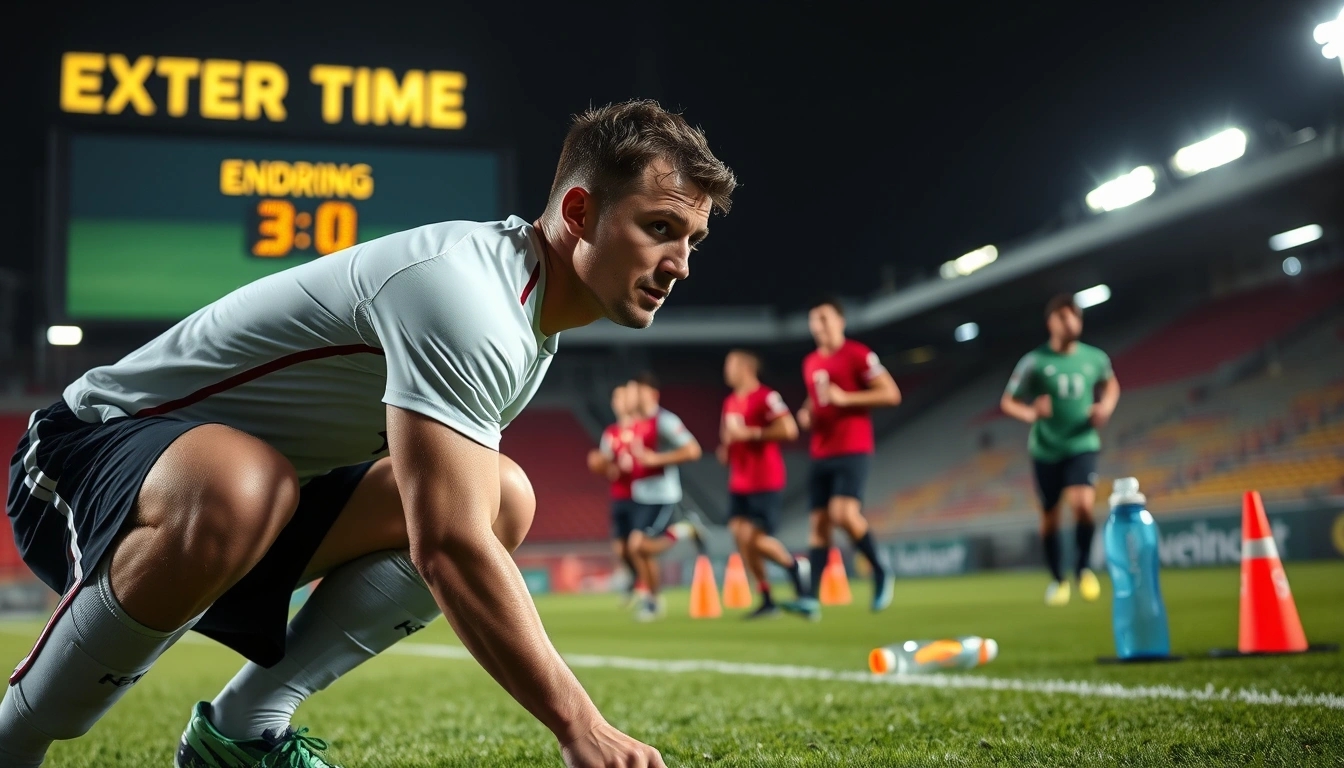Alright, let’s talk about those dreaded extra minutes in football — the moments when players look like they’re running on fumes and coaches suddenly morph into mad scientists trying to outwit the clock and each other. It’s not just an extension of the game; it’s a whole new beast that messes with stamina and forces split-second tactical decisions that can make or break the match.
Physical Toll: When Legs Turn to Lead
Extra time? More like extra torture for tired legs. Players who were sprinting like maniacs for 90 minutes suddenly feel like they’re wading through molasses. Speed drops, reactions slow down, and those sharp passes become more like hopeful punts. This isn’t just about tired muscles; it’s about every fiber screaming for mercy. You’ll often see the difference in pace between the first half and these nail-biting final minutes — it’s brutal.
| Factor | Effect on Players |
|---|---|
| Muscle Fatigue | Reduced sprint speed, slower recovery |
| Energy Depletion | Lower stamina, higher injury risk |
| Coordination Loss | More mistakes, sloppy ball control |
Mental Fatigue: The Invisible Opponent
It’s not just the legs that get tired; the brain? Oh boy, that’s a whole different story. Extra time demands insane focus — every pass, every tackle, every decision gets magnified. When your brain’s fried, mistakes sneak in like uninvited guests. Poor decisions, missed chances, or that inexplicable lapse that lets the opponent score. Coaches often talk about physical fitness, but mental sharpness in these moments? Equally crucial.
- Heightened pressure leads to anxiety spikes.
- Decision-making slows down, even for veterans.
- Players might “zone out” briefly, costing precious seconds.
Substitution Strategies: Coaches’ Last Gamble
Here’s where the chess match heats up. Coaches have a limited number of subs, and when extra time rolls around, it’s like playing poker with your cards face-up. Do you bring on fresh legs to keep up the pressure? Or hold back your best players for a potential penalty shootout? Timing is everything — a wrong move here can turn the tide against you.
Timing Is Everything
Bringing a sub on too early? Waste of a precious resource. Too late? The fresh player might not have enough time to impact the game. Coaches need to read fatigue levels, current momentum, and even the psychological state of their squad. It’s a high-wire act.
Impact Players: Who to Save and When
Some players are like those old reliable batteries — they just don’t quit. Coaches often save these endurance machines for the final grind or the nerve-wracking penalty shootout. It’s a gamble, but sometimes you gotta trust your gut over cold stats.
| Player Type | Role in Extra Time |
|---|---|
| High-Endurance Midfielders | Keep the tempo, cover ground |
| Creative Forwards | Exploit tired defenses |
| Defensive Anchors | Hold the line, prevent late goals |
Nutrition and Hydration: Fueling the Final Push
You might think players just guzzle water and call it a day, but nutrition during extra time is a science in itself. Hydration strategies can be the difference between a burst of energy and crashing hard. Energy gels, sugary drinks — do they actually help or just give a quick spike followed by a nosedive? Opinions vary, but one thing’s clear: what players consume before and during those extra minutes matters big time.
Hydration Breaks: More Than Just a Pause
These breaks aren’t merely a chance to catch breath — they’re golden moments to reset mentally and physically. Coaches use them to shout last-minute instructions, players grab a quick sip, and everyone tries to shake off the fatigue. Don’t underestimate their value.
Psychological Effects: Pressure Cooker Moments
Extra time cranks the pressure up to eleven. The crowd’s roaring, the clock’s ticking, and every touch feels like a make-or-break moment. Some players thrive, turning into legends; others crumble under the weight. Handling stress, maintaining focus, and staying calm are skills often overlooked but vital.
Training for Extra Time: Preparing for the Unknown
Teams that prepare for extra time in training often have the edge. They work on endurance drills, mental toughness, and simulating those high-pressure scenarios. It’s about being ready to push beyond 90 minutes, physically and mentally.
| Training Focus | Benefit |
|---|---|
| Endurance Conditioning | Delay muscle fatigue |
| Mental Resilience Drills | Improve focus under pressure |
| Simulated Extra Time Matches | Better tactical awareness |
Historical Examples: When Extra Time Changed the Game
Remember the 2010 World Cup quarter-final between Uruguay and Ghana? Extra time was a rollercoaster that saw players exhausted, minds frazzled, and one of the most dramatic penalty shootouts ever. Matches like these show how fatigue and strategy collide to create unforgettable moments.
In the end, extra time isn’t just “more football.” It’s a brutal, unpredictable test of stamina, strategy, and nerves. Players and coaches alike must adapt, improvise, and sometimes just survive the chaos. And that’s what makes football so thrilling — the beautiful game, stretched to its limits.
Physical Toll: When Legs Turn to Lead
Extra time in football isn’t just a cheeky little add-on; it’s more like a relentless beast that chews up players’ stamina and spits out shadows of their former selves. You think 90 minutes is tough? Try pushing your body for another 30, when every muscle screams and even the toughest legs start feeling like they’ve been dipped in concrete. It’s no wonder that during extra time, you often see players slowing down, missing their usual sharp turns, and just generally looking like they’re running through molasses.
Why does this happen? Well, the human body has its limits, and footballers are no exception. After the initial 90, glycogen stores—the fuel muscles rely on—are seriously depleted. Without enough energy, muscles can’t contract as efficiently, leading to that dreaded heavy legs syndrome. And it’s not just about running; even simple actions like quick passes or sharp tackles become harder to pull off. You might notice players dragging their feet or opting for safer, less risky plays—not because they’re lazy, but because their bodies just can’t keep up.
| Physical Effects During Extra Time | Impact on Performance |
|---|---|
| Muscle Fatigue | Reduced speed, slower reaction times |
| Dehydration | Cramping, dizziness, loss of focus |
| Energy Depletion | Less power in sprints and tackles |
| Increased Injury Risk | Muscle strains, sprains due to fatigue |
And let’s not forget the heat. If the game’s played on a scorching day, extra time can turn into a nightmare. Sweat pours out, hydration tanks run dry, and players become walking time bombs waiting to cramp up or worse. Coaches and trainers scramble to get those water bottles in players’ hands during breaks, but sometimes it feels like a losing battle.
- Tip 1: Proper warm-up and pacing during the first 90 minutes can help delay fatigue.
- Tip 2: Strategic substitutions are crucial to keep fresh legs on the pitch.
- Tip 3: Hydration and nutrition before and during the match can’t be an afterthought.
Interestingly, some players seem almost superhuman in these moments. They tap into a mysterious reserve of energy—maybe it’s adrenaline, maybe it’s sheer willpower—but they manage to keep pushing when everyone else is fading. However, these moments are rare, and for most, extra time is a brutal endurance test. The body rebels, the legs turn to lead, and the beautiful game becomes a gritty battle of survival.
So next time you watch a match go into extra time, don’t just focus on the scoreline. Pay attention to those subtle signs—the slower sprints, the missed passes, the players grabbing their hamstrings. That’s the physical toll speaking loud and clear. It’s a reminder that football isn’t just skill and strategy; it’s a war of attrition where stamina often decides the true winner.
Mental Fatigue: The Invisible Opponent
Okay, let’s get real about extra time in football — it’s not just the legs that start to wobble, but the brain too. You might think, “Hey, it’s just a bit more running,” but no, the mind gets absolutely battered out there. When the clock ticks past 90, players aren’t just fighting physical exhaustion; their brains are screaming for a break. The intense focus required during those nail-biting extra minutes can turn even the sharpest minds into mush. It’s like trying to solve a Rubik’s Cube after pulling an all-nighter — mistakes creep in, decisions get sloppy, and suddenly, that crucial pass or shot goes horribly wrong.
| Mental Fatigue Effects | Impact on Game |
|---|---|
| Reduced concentration | Missed opportunities, sloppy passes |
| Slower reaction times | Delayed tackles, poor positioning |
| Increased frustration & stress | More fouls, reckless challenges |
| Poor decision-making | Wrong tactical choices, turnovers |
Now, I know what you’re thinking — “Surely these pros are trained for this, right?” Well, yes and no. Sure, they have the stamina, but the mental grind of extra time is a whole different beast. Imagine chasing a ball for 90 minutes, then being told, “Cool, keep going — but now with your brain on overdrive.” The pressure cooker situation means players have to stay alert, anticipate opponents’ moves, and make split-second calls while their mental batteries are running on fumes. It’s exhausting! Coaches often say the final minutes are where games are won or lost — and that’s not just about fitness but brainpower.
- Focus Breakdown: Players’ attention span narrows, leading to tunnel vision and missed teammates.
- Emotional Rollercoaster: Anxiety spikes, making it harder to stay calm and composed.
- Memory Lapses: Forgetting plays or tactical instructions becomes common.
Here’s a fun (or tragic) fact: some players literally start “zoning out” during extra time. They’re physically there but mentally checked out, which is a nightmare for any team. This mental fog can be the difference between a last-minute goal or a heartbreaking loss. And don’t get me started on penalty shootouts — that’s when mental fatigue really shows its ugly face. The pressure to perform when your brain’s fried? Yikes.
Tips to Combat Mental Fatigue in Extra Time:- Practice mindfulness and breathing techniques during training.- Use short, clear tactical instructions to avoid confusion.- Rotate players to keep mental energy fresh.- Encourage positive self-talk to manage stress.
So next time you watch a game drag into extra time, don’t just watch the tired legs — watch the eyes, the body language, the tiny mistakes. That invisible opponent, mental fatigue, is playing just as hard as anyone on the pitch. And honestly? Sometimes it’s the toughest to beat.

Substitution Strategies: Coaches’ Last Gamble
When the clock ticks past the 90-minute mark and the game drifts into extra time, the pressure on managers to make the right substitution calls skyrockets. This isn’t just about swapping tired legs for fresh ones; it’s a complex chess match where every move can either save the team or send it crashing down. The way coaches juggle their remaining substitutes during extra time is often the difference between glory and heartbreak — a high-stakes gamble that demands razor-sharp instincts and a pinch of luck.
- Fresh Legs vs. Tactical Adjustments: Sometimes, it’s not just about energy but also about changing the game’s entire flow. A manager might bring on a speedy winger to exploit a tired defense or a defensive midfielder to close gaps and hold a slender lead.
- Risk of Disruption: Tossing in a new player can shake up team chemistry — not always for the better. The substitute needs to slot in quickly, or the whole rhythm might collapse like a house of cards.
Now, timing is everything here. A substitution at the 91st minute might seem like a no-brainer to inject some pace, but if the player is cold or not mentally ready, it backfires spectacularly. On the flip side, waiting too long might mean missing the last chance to influence the match’s outcome.
| Substitution Timing | Potential Benefits | Risks |
|---|---|---|
| Early Extra Time | Fresh energy to control the game | Player might tire again if extra time drags on |
| Mid Extra Time | Counter tiredness, tactical tweak | Less time to impact the game |
| Late Extra Time | Boost for penalty shootout or final push | Minimal game time to influence play |
But here’s the kicker — not all players are created equal when it comes to stamina. Some are like Duracell bunnies, seemingly able to run forever, while others fade fast. Coaches often face the dilemma of whether to keep their “impact players” on the field, risking exhaustion, or bench them to save energy for a potential penalty shootout.
- Who to Save? Star forwards or creative midfielders may be benched strategically, preserving their sharpness for the lottery of penalties.
- Who to Use? Defensive substitutes or utility players might be introduced to hold the line or disrupt opponents’ rhythm.
It’s a psychological game too. Substitutes coming in during extra time often carry the weight of expectation. Are they ready to handle the pressure? Sometimes, the fresh legs don’t just bring physical energy but a new mindset — a fearless attitude that can spark a comeback or seal a win.
In short, substitution strategy in extra time isn’t just a routine decision — it’s a high-wire act with no safety net. Managers must balance the physical condition of players, tactical needs, and the unpredictable flow of the match. Screw it up, and you’re the villain; get it right, and you’re a genius.
So next time you watch a game go into extra time, keep an eye on those substitutions. Behind the scenes, a battle of wits and nerves is unfolding, with coaches playing their last and most daring cards.
Timing Is Everything
When it comes to extra time in football, deciding when to bring on a substitute isn’t just a routine call — it’s a high-stakes gamble that can flip the entire script of the match. Coaches often find themselves staring at the clock, sweat dripping, heart racing, trying to read not just the scoreboard but the subtle signs of player exhaustion and momentum shifts. It’s like playing chess at 100 miles per hour, except the pieces are sweaty, tired athletes who might trip over their own feet if you’re not careful.
First off, you’ve got to consider the fatigue factor. Players who’ve been grinding for 90 minutes plus extra time are often running on fumes. Their legs feel heavier than a sack of bricks, and their usual sharpness? Yeah, that’s taken a nosedive. Bringing in a fresh pair of legs can inject some much-needed energy, but if you do it too early, you risk running out of substitutes later when the game might head to penalties or a final frantic push. Wait too long, and the players on the field might just collapse before the sub can make any difference.
- Early substitution: Can disrupt the opposing team’s rhythm but may leave you short on options later.
- Late substitution: Risks players being too drained to keep up but preserves tactical flexibility.
And then there’s the psychological aspect. Sometimes, bringing on a sub isn’t just about fresh legs; it’s about sending a message — a burst of confidence, a shake-up to the team’s mojo. Coaches often pick players known as “impact subs,” those who might not have started the game but have the knack for turning it on when the pressure’s sky-high.
| Substitution Timing | Pros | Cons |
|---|---|---|
| Early Extra Time (91-100 mins) | Fresh energy, disrupt opponent’s flow | Fewer options left for later stages |
| Mid Extra Time (101-110 mins) | Balances energy boost and tactical flexibility | Risk of player fatigue still present |
| Late Extra Time (111-120 mins) | Preserves subs for last-minute impact or penalties | Players may be too tired to benefit fully |
But let’s not forget the flow of the match. Sometimes the game is a slugfest, slow and scrappy, and other times it’s a frantic, end-to-end rollercoaster. If your team is holding onto a slim lead, a cautious sub to shore up defense might be the call. If you’re chasing the game, you might gamble on an audacious attacking sub to shake things up. It’s a balancing act between reading the pitch and trusting your gut.
In the end, because the perfect substitution at the wrong moment is just as useless as no substitution at all. Coaches who master this art can turn extra time from a dreaded endurance test into an opportunity to outsmart, outlast, and outplay their opponents. And if you think it’s easy, well, you’ve never been in the hot seat with 10 minutes of extra time left and the whole stadium holding its breath.
So next time you see a sub trot on during extra time, remember: that change might just be the difference between glory and heartbreak.
Impact Players: Who to Save and When
Alright, let’s talk about those special players on the pitch during extra time — the ones who seem to have a secret stash of energy, like batteries that just won’t quit. Coaches face a real headache here: do you keep your workhorse grinding away, or do you bench them to save their legs for the looming penalty shootout? It’s a tightrope walk, and sometimes it feels like guessing which way the coin will land.
First off, not all players are created equal when it comes to stamina. Some midfielders or forwards seem to run on pure adrenaline, while others visibly slow down, their legs turning to jelly after 90 minutes. The coach’s job is to spot these energy reservoirs — the players who can still sprint, press, and make those sharp turns when everyone else is gasping for air.
| Player Type | Extra Time Strengths | When to Use |
|---|---|---|
| Endurance Runner | Maintains pace, covers ground well | Early extra time to control midfield |
| Impact Sub | Fresh legs, explosive bursts | Last 15 mins to change tempo |
| Penalty Specialist | Calm under pressure, precise kicks | Save for shootout |
| Creative Playmaker | Vision and passing accuracy | When team needs a spark |
Now, here’s the kicker: coaches often hold back certain players, especially those who are penalty shootout specialists. You know the type — the ones who don’t just kick the ball but seem to psych out the goalkeeper with their steely gaze. Keeping these players fresh for the shootout might mean sacrificing some attacking punch during extra time, but hey, sometimes you gotta play the long game.
But it’s not just about physical freshness. Mental sharpness counts big time. A player who’s spent the last 120 minutes running their heart out might start making sloppy passes or miss crucial tackles. So, coaches also consider who’s still mentally in the zone. Sometimes, a tired but experienced player can still read the game better than a fresher but less savvy teammate.
- Tip 1: Monitor player fatigue closely — not just legs, but focus and decision-making.
- Tip 2: Use substitutions not just to rest players but to switch tactics if needed.
- Tip 3: Communicate clearly with players about their roles in extra time and penalties.
Here’s a little insider nugget — some coaches keep a player on the bench who’s not the fastest or strongest but has nerves of steel. This player might only get on the pitch if the match heads to penalties. It’s like having a secret weapon in your back pocket, ready to be unleashed when it matters most.
Coach’s Dilemma:- Risk using your best striker now to try and win in extra time- Or save them for penalties, hoping the team can hold on without them
In the end, it’s a gamble. Sometimes the gamble pays off, other times it backfires spectacularly. But that’s football for you — unpredictable, thrilling, and full of tough calls.
Nutrition and Hydration: Fueling the Final Push
Alright, let’s get real about what players chow down and sip on before and during extra time — because, believe it or not, this stuff can make or break their stamina when the clock ticks beyond 90 minutes. Coaches and players often obsess over tactics and formations, but sometimes they forget the basics: fuel and fluids. Without the right nutrition and hydration, even the fittest athletes can feel like they’re running through molasses in those nail-biting final minutes.
First off, hydration. It’s the unsung hero of endurance. You might think a quick gulp of water here and there is enough, but during extra time, the body’s demand for fluids skyrockets. Sweat rates increase, and if players don’t replace lost fluids and electrolytes, cramps and fatigue sneak in like unwanted guests. Hydration is not just about quenching thirst — it’s about maintaining muscle function and cognitive sharpness.
- Pre-game hydration: Players usually start sipping water or sports drinks hours before kickoff to top off their reserves.
- During the game: Small, regular sips during breaks keep dehydration at bay.
- Extra time: This is where those quick hydration breaks become gold — missed chances here can lead to disaster.
Now, about the food side of things — this is where things get a bit tricky. Before the match, players load up on carbs to stockpile glycogen, the energy currency of muscles. But come extra time, those glycogen stores can be dangerously low. Enter energy gels and sports drinks, which promise a quick sugar rush to keep the engine running. But do they really work? Well, yes and no.
| Pros | Cons |
|---|---|
| Rapid energy boost | Risk of sugar crash if not timed properly |
| Easy to digest | Can cause stomach discomfort for some |
| Portable and convenient | Not a substitute for balanced nutrition |
The timing and individual tolerance are everything here. Slamming an energy gel at the wrong moment might leave a player feeling jittery or worse, crashing hard when they need to sprint. Coaches and nutritionists often stress testing these strategies in training — because trial and error during a high-stakes game? That’s a recipe for disaster.
And don’t underestimate the mental reset hydration breaks offer. It’s not just about gulping fluids; it’s a moment to breathe, refocus, and strategize. Sometimes a player’s brain is as parched as their muscles.
To sum it up, extra time is a brutal beast that demands more than just grit and skill. It demands smart nutrition and hydration strategies that are often overlooked but absolutely crucial. Without the right fuel and fluids, even the best players might find themselves running on empty just when it matters most.
Energy Gels and Drinks: Do They Really Work?
Alright, let’s get real about those energy gels and sugary drinks players guzzle down during extra time. You’ve seen it countless times—athletes popping open a neon-colored packet or chugging a sugary beverage, hoping to summon some magic juice to keep their legs moving and brains sharp. But do these quick fixes actually help, or are they just setting up for a spectacular crash when the clock’s ticking and the pressure’s on?
First off, energy gels and sports drinks are designed to provide a rapid source of carbohydrates, the body’s go-to fuel during intense physical activity. When players hit that extra time, their glycogen stores—the fancy term for stored carbs—are often running low, so a quick sugar hit can theoretically top up those reserves. Sounds great, right? But here’s the catch: the body can only process so much sugar at once, and sometimes, a sudden spike in blood sugar is followed by a nasty dip, aka the dreaded “sugar crash.”
| Pros of Energy Gels & Drinks | Cons of Energy Gels & Drinks |
|---|---|
| Quick energy boost | Potential for blood sugar crash |
| Easy to consume on the move | May cause stomach discomfort |
| Replenishes glycogen stores | Not a substitute for proper hydration |
| Convenient and portable | Can lead to over-reliance on sugar spikes |
And don’t even get me started on the stomach troubles. Some players swear by gels, while others end up doubled over, regretting every sweet morsel. It’s a bit like playing roulette with your gut—sometimes it works, sometimes it doesn’t. Plus, if the timing’s off and a player takes a gel too late, the energy might kick in just as the game ends, leaving them drained right when they need to be sharpest.
- Tip #1: Test different gels and drinks during training, not just match day.
- Tip #2: Combine sugars with electrolytes to avoid cramping and dehydration.
- Tip #3: Avoid overloading on sugar; small, frequent doses work better.
Now, some nutritionists argue that natural sources like bananas or dates might be just as effective—plus, easier on the stomach. But hey, when you’re in the heat of the moment, convenience wins. Still, the key takeaway is that energy gels and drinks aren’t magic potions. They’re tools that need to be used wisely, considering the player’s individual tolerance and timing.
So, do they really work? Yes, but with a big ol’ asterisk. They can provide a much-needed boost, but if you’re not careful, you might end up crashing harder than a rookie goalie on their first penalty kick. Coaches and players should approach these supplements with a mix of enthusiasm and caution—testing, timing, and moderation are the secret sauce.
In the end, it’s not just about grabbing the quickest sugar hit. It’s about smart fueling, hydration, and listening to your body. Because when the whistle blows and extra time kicks in, you want your energy to last, not fizzle out like a damp firecracker.
Hydration Breaks: More Than Just a Pause
Alright, let’s get real for a second. Those hydration breaks during extra time? They’re not just some random excuse for players to gulp down water and catch their breath. Nope, they’re actually crucial moments that can flip the entire script of a game. You might think it’s just a quick pit stop, but these little pauses are like secret weapons, giving players a chance to hit the reset button physically and mentally. And honestly, most folks watching probably don’t give them the respect they deserve.
Think about it: after 90 grueling minutes, players are running on fumes. Legs feel like lead, brains are foggy, and the heart’s pounding like a drumline. Suddenly, the whistle blows, and bam! They get a few precious minutes to rehydrate, refuel, and maybe even get a pep talk from the coach. It’s like a mini timeout in a basketball game but with way higher stakes because every second counts in extra time.
- Physical Recharge: Sweating buckets means losing electrolytes fast, and dehydration can tank performance quicker than you’d expect. These breaks allow players to replenish fluids, which helps maintain muscle function and stave off cramps.
- Mental Reset: The mental grind is just as brutal. A quick pause lets players shake off the stress, refocus, and prepare for the next intense burst of action.
- Tactical Adjustments: Coaches use this window to shout instructions, tweak formations, or remind players about set-pieces. It’s like a mini strategy huddle that can totally change momentum.
| Break Benefit | Impact on Players | Game Influence |
|---|---|---|
| Physical Recovery | Rehydration, electrolyte balance, muscle relief | Maintains stamina, reduces cramp risk |
| Mental Refresh | Focus reset, stress relief, motivation boost | Improves decision-making, reduces errors |
| Coaching Opportunity | Instructions, tactical tweaks, morale boost | Can shift momentum, exploit opponent weaknesses |
But let’s not kid ourselves—these breaks aren’t a magic fix. Sometimes, players just look like zombies after the whistle blows again, stumbling around like they’ve seen a ghost. It’s a brutal reminder that no amount of water can fully erase fatigue. Still, those few minutes can be the difference between a last-minute goal or a missed chance.
And here’s a little insider nugget: hydration breaks can also mess with the rhythm of the opposing team. Imagine you’re on a roll, pressing hard, and suddenly the game halts. That momentum? Poof, gone. It’s a double-edged sword that coaches and players have to navigate carefully.
So next time you see players sprinting to the sidelines during extra time, don’t just think “water break.” Think of it as a mini survival strategy—a moment where the game pauses but the battle is far from over. Those few sips and seconds of rest might just be the secret sauce that keeps players sharp and hungry for victory.
In the wild world of football, every tiny advantage counts, and hydration breaks? They’re quietly stealing the spotlight, one gulp at a time.
Psychological Effects: Pressure Cooker Moments
Extra time in football is like stepping into a pressure cooker — the heat turns up, and suddenly every move feels like it’s under a microscope. Players aren’t just battling physical exhaustion; they’re wrestling with their own minds. It’s a strange beast, this psychological strain, because it’s invisible but can be just as brutal as running that last sprint. When the clock ticks beyond 90 minutes, the mental game becomes the true battleground.
Think about it: the stakes are sky-high, the crowd’s roaring, and every mistake could cost the team dearly. Some players thrive in this chaos, turning nerves into adrenaline and rising like heroes. Others? Well, they might crumble, second-guessing every pass or shot, weighed down by the fear of failure. It’s not just about skill anymore — it’s about mindset, resilience, and sometimes just plain luck.
- Stress and Decision-Making: Under pressure, the brain’s ability to process information can slow down. That split-second hesitation or a rushed decision can be the difference between glory and heartbreak.
- Confidence vs. Anxiety: Confidence can be contagious on the pitch, but anxiety spreads just as fast. Players who keep their cool often lift the whole team, while one anxious teammate might drag spirits down.
- Focus and Distraction: With fatigue creeping in, staying focused is a monumental challenge. The mind wanders, doubts creep in, and suddenly a simple clearance becomes a disaster.
| Response | Effect on Performance | Typical Player Behavior |
|---|---|---|
| Heightened Arousal | Increased alertness but risk of overexertion | Explosive bursts, aggressive tackles |
| Stress-Induced Freeze | Delayed reactions, poor decision-making | Hesitation, missed opportunities |
| Resilience | Maintained or enhanced performance under pressure | Calm leadership, clutch plays |
Now, coaches often try to prepare players mentally for these “pressure cooker moments” but let’s be honest — it’s easier said than done. No amount of pep talks can fully simulate the electric tension of extra time. Some teams bring in sports psychologists, others run high-pressure drills, but when the whistle blows, it’s all about how each player’s mind handles the heat.
And here’s a kicker: sometimes the crowd plays a huge role. The deafening cheers or jeers can either fuel a player’s fire or blow out their mental candle. Ever noticed how some players seem to shine brighter at home? It’s not just familiarity — it’s psychological comfort that allows them to block out distractions and focus.
- Practical Tip: Players who develop routines for managing stress — like controlled breathing or focusing on small, immediate tasks — often outperform those who get overwhelmed.
- Team Dynamics: Leadership on the pitch is key. A calm captain or vocal midfielder can steady nerves and keep the collective mind sharp.
In the end, extra time isn’t just a physical marathon; it’s a mental chess match. The pressure cooker moments reveal who’s got the grit to clutch victory and who folds under the spotlight. And honestly? That unpredictability is what makes football so thrilling — you never know who’s gonna be the hero or the heartbreaker.

Training for Extra Time: Preparing for the Unknown
When it comes to football, no one really wants to think about extra time until the clock hits 90 and the scoreboard’s still deadlocked. But here’s the kicker: teams that actually prepare for those nerve-wracking additional 30 minutes often find themselves with a secret weapon. It’s not just about running an extra lap or two; it’s about conditioning the body and mind to endure the unexpected grind. You see, regular training sessions focus on that neat, tidy 90-minute window. But extra time? That’s a whole different beast.
Coaches who anticipate extra time tend to push their squads beyond the usual limits during practice. This means longer drills, endurance runs, and mental exercises designed to build resilience. Players learn to dig deeper, to keep their heads in the game when their legs feel like lead. It’s almost like preparing for a boxing match where you know the final round could go one minute longer than expected — you gotta have that stamina and grit.
| Training Focus | Purpose | Example Exercises |
|---|---|---|
| Endurance Conditioning | Build physical stamina to sustain high performance | Interval runs, extended small-sided games, long-distance jogging |
| Mental Toughness | Enhance focus and decision-making under fatigue | Simulated pressure drills, mindfulness sessions, tactical problem-solving |
| Recovery Techniques | Improve quick physical and mental recovery during breaks | Hydration strategies, breathing exercises, short rest protocols |
But let’s be honest — it’s not just about running until you puke. The mental game is just as crucial. Extra time is a psychological minefield; players are exhausted, the crowd’s roaring, and one slip-up can cost the entire match. So, training for extra time often includes scenarios that mimic this pressure cooker atmosphere. Coaches throw in unexpected challenges during practice to see who can keep their cool and who’s gonna crumble.
- Simulated fatigue drills: Players perform tactical tasks after intense physical exertion to mirror late-game conditions.
- Penalty shootout rehearsals: Because, let’s face it, extra time often ends in penalties, and nerves can be killers.
- Team communication exercises: Fatigue can mess with how well players talk to each other — practicing this keeps the team tight.
Here’s a little insider nugget: some teams actually schedule “extra time days” where the training session itself lasts longer than usual, pushing players beyond their comfort zones. It’s brutal, sure, but it pays dividends. Players get used to that lingering tiredness and learn how to manage their energy smartly — when to sprint, when to conserve, when to trust their instincts.
And no training for extra time would be complete without attention to nutrition and hydration. Coaches and nutritionists work hand-in-hand to ensure players enter the pitch with enough fuel to last beyond 90 minutes. Energy gels, electrolyte drinks, quick snacks during halftime — all tailored to keep that energy bar from plummeting.
In the end, training for extra time is about embracing the unpredictable. It’s about saying, “Yeah, the game might drag on longer than we want, but we’re ready.” Teams that do this don’t just survive extra time — they thrive. And sometimes, that’s all the difference between heartbreak and glory.
Historical Examples: When Extra Time Changed the Game
Ah, extra time — the football equivalent of that unexpected sequel nobody asked for but everyone ends up watching anyway. It’s the stage where heroes are made, villains are born, and legs start to feel like lead pipes. Now, let’s rewind and dive into some classic matches where those nail-biting additional minutes flipped the script entirely, proving that extra time isn’t just an add-on; it’s a game-changer in the truest sense.
Take the 2010 FIFA World Cup final between Spain and the Netherlands. Both teams slugged it out for 90 grueling minutes, neither willing to blink. Then came extra time, and boy, did it reveal the cracks. Spain’s Andrés Iniesta, despite the exhaustion, managed to find that sliver of space and score the winning goal, a moment etched forever in football lore. Fatigue was everywhere — players were dragging, misplacing passes — but Iniesta’s coolness under pressure showed how mental stamina can outlast physical tiredness.
But hey, it’s not always the fresh-faced midfielders stealing the show. Remember the 1999 UEFA Champions League final? Manchester United’s comeback against Bayern Munich is the stuff of legends. Trailing 1-0 as the clock ticked past 90, United’s substitutes Teddy Sheringham and Ole Gunnar Solskjær turned the game on its head in injury time. Talk about clutch! This match underscores how substitution strategy during those extra moments can be the final, decisive play.
| Match | Year | Key Player(s) | Outcome | Fatigue & Strategy Impact |
|---|---|---|---|---|
| Spain vs Netherlands (World Cup Final) | 2010 | Andrés Iniesta | Spain wins 1-0 in extra time | Iniesta’s mental sharpness overcame physical fatigue |
| Manchester United vs Bayern Munich (Champions League Final) | 1999 | Teddy Sheringham, Ole Gunnar Solskjær | United wins 2-1 with two injury-time goals | Substitution strategy turned the tide dramatically |
| Italy vs Germany (Euro 2016 Quarterfinal) | 2016 | Éder | Italy wins 2-1 in extra time | Endurance and tactical patience paid off |
And then there’s the psychological rollercoaster. Let’s not forget Euro 2016’s quarterfinal between Italy and Germany. Both teams looked like zombies by extra time, but it was Italy’s Éder who found that last ounce of energy to net the winner. The Germans, despite their physical prowess, seemed mentally drained, showing how crucial psychological resilience is when everyone’s gas tank is empty.
- Fatigue sets in: Players slow down, misjudge passes, and lose concentration.
- Coaches adapt: Tactical tweaks and substitutions become vital.
- Mind over matter: Mental toughness often trumps physical exhaustion.
Funny thing is, extra time can sometimes feel like a cruel joke — just when you think the drama’s done, it kicks in harder. Yet, those moments are what make football so addictive. It’s a brutal test of endurance, strategy, and sheer willpower, where the unexpected becomes reality. And trust me, the history books are full of these unforgettable tales where extra time didn’t just extend the game; it rewrote the ending entirely.
Frequently Asked Questions (The title must be written in English.)
- How does extra time physically affect football players?
Extra time is like running a marathon after a sprint—players’ legs often feel heavy, their speed drops, and their muscles scream for relief. This added strain can lead to slower reactions and a higher chance of injury as fatigue sets in deep.
- Why is mental fatigue during extra time so critical?
Think of the brain as the team’s control tower. When extra time drags on, maintaining laser focus becomes a Herculean task. Mental exhaustion can cause players to misread the game, make poor passes, or miss crucial chances, turning the tide against their team.
- What role do substitutions play in extra time strategy?
Substitutions in extra time are a coach’s secret weapon. Fresh legs can inject energy and change the game’s rhythm, but timing is everything. Bringing a player on too early or too late can either waste their impact or leave the team vulnerable.
- How important is nutrition and hydration during extra time?
Fueling up isn’t just for before the match. During extra time, proper hydration and energy boosts like gels or drinks can keep players sharp and prevent the dreaded energy crash. Skipping this can be like running on empty when it matters most.
- Can hydration breaks really influence the outcome of extra time?
Absolutely! Hydration breaks are more than just a breather—they’re a chance for players to reset mentally and physically. These pauses can recharge focus and help maintain stamina, often swinging momentum in a tight match.
- How does psychological pressure affect players in extra time?
Extra time is a pressure cooker moment where nerves run high. Players who thrive under stress can become heroes, while others might falter. Managing this mental strain is as crucial as physical fitness for success.
- Why do some teams train specifically for extra time?
Preparing for extra time is like training for an unexpected overtime in a game—it builds endurance and mental toughness beyond the usual 90 minutes. Teams that do this often have an edge, staying sharper and more resilient when the clock ticks beyond regular time.
- Can you give examples where extra time changed the game’s outcome?
History is packed with jaw-dropping moments where extra time flipped the script. From stunning goals to tactical masterstrokes, these periods have turned underdogs into legends and made matches unforgettable.












